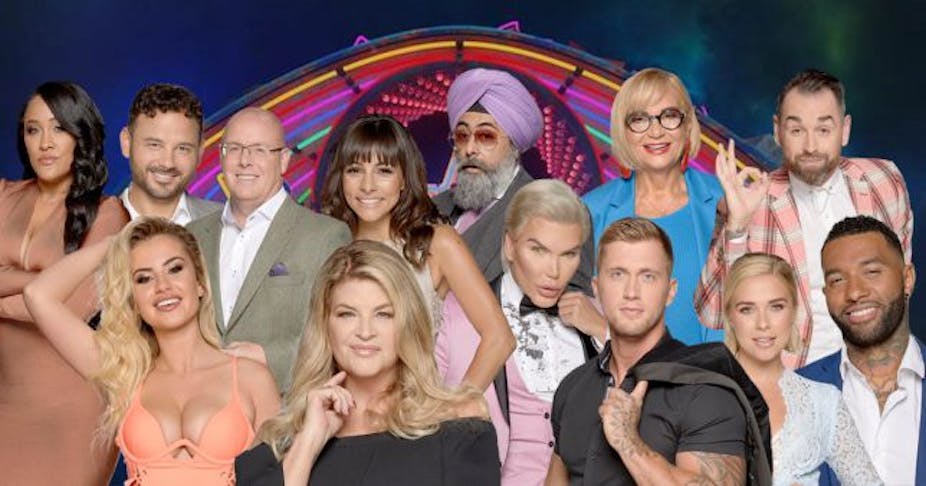So, we’re told that the UK’s Celebrity Big Brother and Big Brother franchise may disappear from UK screens, at least for a while. Channel 5 is reported to be planning for “a year without” the reality format in 2019 due to declining ratings. As an avid viewer, I’ve read these reports with disappointment and concern, trying to imagine my schedule without the welcome return of one of my favourite TV programmes of all time.
I’m a professor of TV Studies, and I’m proud to say I don’t think I’ve missed an episode of Celebrity Big Brother (CBB) since it began in 2001. Given that the format – and its close sibling Big Brother – have pretty much become synonymous with “trash television” in the UK, this statement may seem contradictory. But I don’t see my job and my enthusiasm for CBB as incompatible. And this is why.
Controversy is one of the primary motors of CBB and is intrinsic to the format – that’s why you put 12 people in a house with differing backgrounds, experiences and political views. But although the ensuing controversies may not have occurred in the “real world” (they emerge from the highly structured environment of the show), they do speak to very real world issues and debates which should matter to us all. This is particularly so when the controversies involve questions of gender, race, sexuality, class or trans identity (as they so often do).
The recent series of CBB was no exception to this. Racism has already emerged as topic of contention in a row between TV psychic Sally Morgan and Scottish TV presenter and comedian Hardeep Singh Kholi. Morgan suggested that – because of the colour of his skin – Kohli looked too “healthy” (or not pale enough) to be a patient in the pretend hospital drama they were staging in the show, wondering if he needed some talcum power to “help” him play the role. She had also previously asked him if she could use that “thingy on his head” (his turban) as a bandage. This prompted a heated conversation about what constituted racism and when it was “appropriate” to raise issues of race.
The incident created the rather uncomfortable spectacle of the predominantly white members of the house suggesting that Kohli may be too “easily offended” by issues which are not really “about” race at all. Former TOWIE reality star Dan Osborne even explained that he felt uncomfortable when Kohli referred to himself as a “brown man”. So, Kohli was essentially shut down within the house as the the younger housemates in particular provided a revealing insight into generational perceptions of a “post-race” society in which race and racism is apparently no longer a “thing”.
Cue twitterstorm
But of course the conversation didn’t stop there: it continued on social media and other forms of popular media coverage. As one viewer – directing her tweet at Kohli – observed:
As is the nature of Twitter, others of course disagreed:
Viewers worked over the question of what constitutes “racism” in British society – how it is recognised, named and debated, as well as the impact of white privilege on how and when racism is “permitted” to be raised.
Check your privilege
Equally, when CBB launched its “Year of the Woman” series in January this year (timed to chime with the centenary of women’s suffrage), there were many who suggested that this was nothing short of a catastrophe for feminism:
What the suffragettes would have made of CBB is impossible to say. But such views seem to consolidate the view that the feminism(s) explored in popular media are intrinsically lacking – and will always fall short of some (mythical) “real thing”. The exploration of feminism, gender equality and women’s position in contemporary society during the series was certainly complex and contradictory – but its value again lay in getting us talking about issues which affect us all.
Some viewers, for example, felt that the programme was sexist towards men and that the theme was redundant – because gender equality had now been achieved:
Others hotly contested this view of the current state of gender equality, with one replying to the tweet with the question of historical inequality:
While some hotly debated the persistence of gender inequalities in contemporary British society, others talked about the lack of intersectionality in CBB’s construction of “feminism”, or the ethics of including in the series Dapper Laughs, also known as comedian Daniel O’Reilly – who, in 2014, made an unpleasant rape joke during his stand-up show which threatened to kill off his career.
Many threads extended the programme’s controversial discussion of the #MeToo sexual harassment movement, while other debates still ignited talk about the “guilt” of working mothers, feminism and generational identity, and the relationship between trans identity and feminism today.
Bold and explicit
The format undoubtedly has its flaws – and it has certainly over the years raised questions of ethics, offence and exploitation. But this doesn’t take away its cultural value as a forum for political discussions about identity. In fact, I can think of few documentaries, dramas or TV discussion shows which have ignited such discussions in such a bold and explicit way.
So I for one will miss the format if it doesn’t return. To the Big Brother franchise I’d like to say thank you, so long, it’s been eye-opening (and please let’s keep the discussion going).

